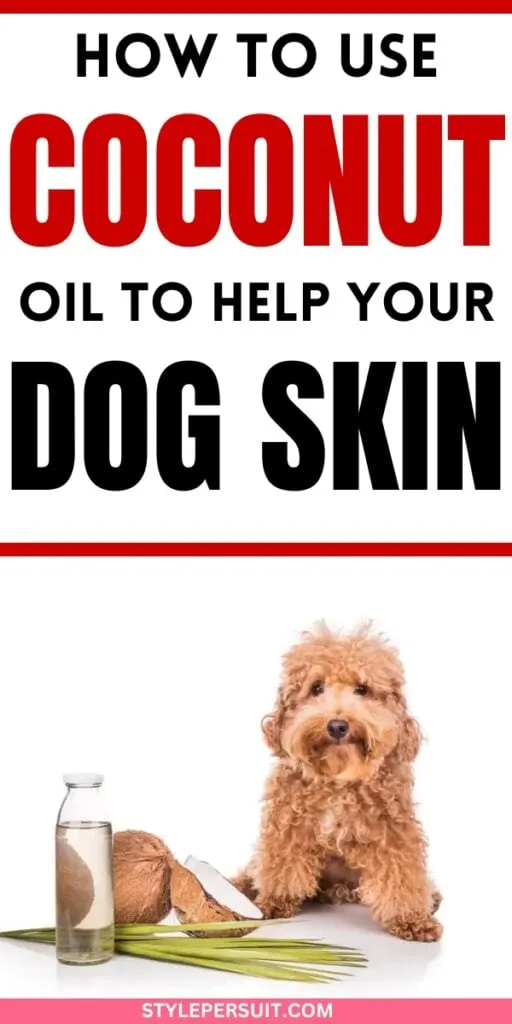You’ve probably seen it on Pinterest, in pet forums, or on TikTok, someone rubbing coconut oil on their dog like it’s the holy grail. It’s slathered on paws, stirred into kibble, even rubbed on bellies.
But is coconut oil actually good for dogs, or is it just another trendy fix-all?
Let’s break it down like you’re chatting with a fellow dog parent over coffee, fur on your pants and all.
Let’s Talk Coconut Oil, Why Is Everyone Raving About It?

Here’s the thing: Coconut oil is everywhere. In your kitchen, your skincare, your hair mask, and now it’s worked its way into your dog’s life too.
And not without reason. It’s packed with saturated fats, particularly a type called medium-chain triglycerides (MCTs), which are thought to offer all sorts of health perks.
But just because it’s natural doesn’t mean it’s always a good fit. Some dogs thrive on it. Others? Not so much.
It’s not magic, but it can be surprisingly helpful in the right situations.
Is It Good to Give Your Dog Coconut Oil?
Short version? Usually, yes, as long as your dog tolerates it.
Coconut oil has antibacterial, antiviral, antifungal, and anti-inflammatory properties. That’s a lot of “anti’s” packed into a spoonful.
When given properly, it can support:
- A shinier coat
- Fewer itchy flare-ups
- Better digestion
- Help with bad breath (yes, really)
- Mild immune support
But here’s the part people skip: not every dog handles it well. Some pups get upset stomachs.
Others just lick it all off before it has a chance to help. Like peanut butter or cheese, it’s all about moderation and knowing your dog.
Start small: ¼ tsp for small dogs, up to 1 tsp for large ones per day mixed into food.
Will Coconut Oil Stop My Dog from Itching?

In many cases, yes. That’s one of the biggest reasons people try it.
If your dog scratches like it’s their full-time job, coconut oil might help calm things down.
The fatty acids create a natural moisture barrier and help soothe inflamed, dry skin. It’s especially helpful for:
- Seasonal dry patches
- Allergies
- Flea reactions
- Hot spots
- Cracked paws and noses
What you’ll need:
- Virgin (unrefined) coconut oil
- Soft towel or your hands
- Optional: gentle dog shampoo for rinsing
Rub a small amount between your palms and gently massage it onto itchy areas. Most dogs love the attention, some might even think it’s treat time.
You can also mix it into their food for an inside-out approach. Just don’t expect overnight miracles. Give it a few days.
Can Coconut Oil Deworm Dogs?
Now this is where it gets a little murky.
You’ll find folks online claiming that coconut oil gets rid of worms, thanks to its lauric acid content, which has some natural antimicrobial benefits.
And to be fair, some owners say their dogs had firmer stools or better digestion after using it regularly.
But let’s be honest: it’s not a replacement for actual deworming meds. If your dog’s dealing with tapeworms, roundworms, or anything parasitic, talk to your vet.
Don’t bet your dog’s health on a pantry product.
Use coconut oil as support, not the whole treatment plan.
What Happens If I Don’t Rinse Coconut Oil Off My Dog?

Short answer: they’ll be greasy.
Dogs don’t sweat the way we do, but they still get buildup. Slathering coconut oil all over them without rinsing can:
- Make their fur look oily or dirty
- Leave residue on furniture, beds, carpets (hello, paw prints)
- Attract more dirt and dust
If you’re applying it topically, use a little bit, think light moisturizer, not lotion overload.
And if they’re super itchy or dealing with a skin flare-up, rinse after 30–60 minutes to avoid buildup.
Pro tip: Try spot treating specific areas instead of going full-on coconut spa day.
Internal Use vs. External Use: Which Works Better?
Honestly, both have their place.
Internal (mixed into food):
- Helps with digestion
- Can support the immune system
- May improve breath and reduce inflammation
External (rubbed on fur/skin):
- Relieves dryness
- Soothes hot spots or bug bites
- Adds shine to the coat
Think of it like olive oil for humans, a little in your salad helps your heart, a little on your skin softens your hands.
Same goes for dogs, just way furrier.
Just make sure you’re using virgin, cold-pressed coconut oil, the unrefined stuff. No additives.
No mystery scents.
Which Oil Is Best for Dogs?
Let’s be fair: coconut oil isn’t the only one on the shelf.
Here’s how it stacks up:
- Coconut oil: Antifungal, skin-soothing, and easy to digest for many dogs. Best for itchy pups or those with flaky skin.
- Fish oil: Omega-3 powerhouse, great for joints, brain health, and serious coat shine.
- Olive oil: Milder option for digestion and coat health; also good for picky eaters.
- Flaxseed oil: A solid plant-based alternative for dogs who can’t handle fish.
Each has its own strengths. Some people rotate oils. Others pick one based on their dog’s needs.
No need to pick sides, just pick what works.
What Happens If a Dog Eats Too Much Coconut Oil?
You might regret it.
Too much coconut oil can lead to:
- Diarrhea
- Vomiting
- Greasy stool
- Lethargy or bloating in some cases
It’s high in saturated fats, good in moderation, but heavy on the belly if overdone.
If your dog has a sensitive stomach, start with a drop, not a dollop.
Dogs with pancreatitis, diabetes, or IBS should stay far away unless your vet says otherwise.
Does Coconut Oil Clean Dogs’ Teeth?
Sort of, but don’t throw out the toothbrush.
Coconut oil has mild antimicrobial properties that may help with plaque and bad breath. Some owners apply a bit to a finger or toothbrush and gently rub their dog’s gums.
But here’s the thing: it’s not a full dental plan. Think of it as a bonus, like chewing parsley or using mouthwash.
Good, but not the whole job.
If your dog’s breath could knock over a cow, coconut oil isn’t going to save you. But it might help a little.
How to Use Coconut Oil for Dogs (Without Making a Greasy Mess)
Here’s where it gets fun. Coconut oil is super versatile. A little goes a long way.
Ways to use it:
- Stir into food (¼–1 tsp, depending on size)
- Rub onto dry paws or elbows
- Massage into itchy skin
- Use as a balm for cracked noses
- Mix into homemade dog treats
- Dab on hot spots (then distract them from licking it off)
Optional: Mix with turmeric or parsley for extra benefits. Just go slow and keep towels nearby.
Signs Coconut Oil Might Not Be Right for Your Dog
If your pup seems… off after starting coconut oil, it might not be a fit.
Watch for:
- Runny poop
- Greasy, sticky fur
- Itchy skin that gets worse
- Allergic reactions (rare, but possible)
Some dogs just don’t tolerate it. Others need a smaller dose. And a few will try to eat the whole jar when you’re not looking.
If something feels off, trust your gut. Or theirs.
Coconut Oil + Seasonal Pet Care Tips
Summer: Coconut oil can help protect paws from hot pavement and soothe bug bites or hot spots.
Winter: It’s great for cracked skin, dry noses, and fur that gets dull from dry indoor heat.
Allergies, dryness, and skin flare-ups tend to spike during seasonal transitions. Keeping a jar of coconut oil handy might help ease the shift.
Final Thoughts: Should You Try It? Or Skip It?
If your dog’s itchy, has dull fur, or needs a little digestive support, coconut oil is worth trying. Just go slow, keep it clean, and listen to your pup’s response.
Here’s a quick cheat sheet:
- Itchy or flaky skin? → Try it topically.
- Dull coat or mild digestive issues? → Add to food (small amount).
- Bad breath? → A dab on the gums may help.
No big promises. Just small improvements that add up over time.
Quick FAQ: Real Questions, Straight Answers
Is it good to give your dog coconut oil?
Yes, in small amounts. It can support skin, digestion, and immunity, if your dog tolerates it.
Will coconut oil stop my dog from itching?
Often, yes. It helps soothe dry skin and reduce inflammation.
Can coconut oil deworm dogs?
Not reliably. It may help with mild gut health, but don’t skip the dewormer.
What happens if I don’t rinse coconut oil off my dog?
They might end up greasy, attract dirt, or feel sticky. Use it sparingly or rinse off.
Which oil is best for dogs?
Depends on their needs. Coconut oil is great for skin. Fish oil is better for joints and brain health.
What happens if a dog eats a lot of coconut oil?
Upset stomach, greasy poop, or vomiting. Start small and go slow.
Does coconut oil clean dogs’ teeth?
A little bit, yes. It has mild antibacterial properties and can freshen breath, but it doesn’t replace brushing.

